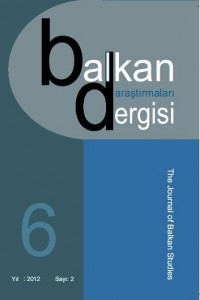Öz
This article aims at exploring the structures of the collective memory
of Albanians during the last 100 years. To that purpose, the concept of
‘collective memory’, first developed by French sociologist Maurice Halbwachs,
and then refined by other scholars in the twentieth century, will be conceptualised
in the frame of equivalence functionalism, i.e. as a solution to a problem.
Such strategy requires a point of reference for the problem, which we take it
to be the Albanian elite’s problem of preserving and/or strengthening their
powerful position. This reference problem focuses attention to the interaction
between the Albanian elites and the masses, elucidating certain structural
features that have influenced the workings of collective memory production.
Anahtar Kelimeler
Kaynakça
- Assmann.J (1988) Collective Memory and Cultural Identity.Avaliable at http://www.history.ucsb.edu/faculty/marcuse/classes/201/articles/95AssmannCollMemNGC.pdf ,accessed at 28.06.2012
- Beim,A. (2007) The Cognitive Aspects of Collective Memory ,Symbolic Interaction Vol. 30, (1) , 7-26.
- Bismili,B. (2011) ‘Identiteti kosovar, real apo artificial’[The Kosovar Identity ,Real or Artificial].Avaliable at http://www.evropaelire.org/content/article/24404415.html ,accessed at 21.05.2012
- Calhoun .C. (1993) Nationalism and Ethnicity Annual Review of Sociology, (19) , 211-239
- Castellan,G. (1999) Historia e Ballkanit [History of the Balkans] , Shtepia e Librit dhe Komunikimit, Tirane
- Clayer,N. (2007) Aux origines du nationalisme albanais [On the Origins of Albanian Nationalism], Karthala
- Clayer,N.(1997) Islam ,State and Society in Post-communist Alba-nia, in Poulton,H., Taji-Farouki,S. (eds) Muslim Indentity and the Balkan State’ Hurst &Company
- Cochran,T. (1990) Culture against the State, Boundary 2, Vol. 17, No. 3 . 1-68
- Confino,A. (1997) Collective Memory and Cultural History: Prob-lems of Method
- The American Historical Review, Vol. 102, (5), 1386-1403
- Dekker,H., Malová,D., Hoogendoorn,S. (2003) Nationalism and Its Explanations Political Psychology, Vol. 24, (2), Special Issue: Na-tional Identity in Europe ,345-376
- Dervishi,K. (2006) Historia e Shtetit Shqiptar 1912-2005 [History of the Albanian State 1912-2005],Botime 55,Tirane
- Draper,S. (1997) The conceptualization of an Albanian nation ,Ethnic and Racial Studies Volume 20, (1),123-44
- Fischer,B. (1984) King Zog and the struggle for stability in Albania, by Boulder: East European Monographs; New York
- Gellner ,E. (2006) Nacionalizmi [Nationalism] Shtepia e Librit dhe Komunikimit, Tirane
- Gellner, E. (1983) Nations and Nationalism. Ithaca, London: Cornwell University Press.
- Gjuraj,T. (2000) A Stable Ecumenical Model? How Religion Might Become a Politcal Issue in Albania ,East European Quarterly ,Vol.34,(1) 21-49
- Gurakuqi, R. National Identity and Religions in Albania.Avaliable at http://www.albanisches-institut.ch/pdf/text4.pdf,accessed at 10.01.2012
- Halbwachs, M. (1980) The collective memory, New York, Harper & Row Colophon Books
- Hardin,R. (1982) Collective action Baltimore: Johns Hopkins Univer-sity Pres
- Hasluck, M.(2005), Kanuni: Ligj i pashkruar shqiptar, Lisitan.
- Hobsbawm, E. J., Kertzer, D.J. (1992) Ethnicity and Nationalism in Europe Today Anthropology Today, Vol. 8, (1), 3-8
- Hohendahl, P.U. (1995) Prismatic Thought: Theodor, W. Adorno. Lin-coln and London: University of Nebraska Press.
- Huddy,L. From (2001) Social to Political Identity: A Critical Exami-nation of Social Identity Theory ,Political Psychology, Vol. 22, (1) , 127-156
- Jelavich,Ch.,Jelavich,B.(1983) History of the Balkans: 18th and 19th Cen-turiesCambridge University Press
- Kansteiner, W. (2002) Finding Meaning in Memory: A Methodologi-cal Critique of Collective Memory Studies ,History and Theory ,Vol. 41, (2) , 179–197
- Krasner,S. (2001) Abiding Sovereignty, International Political Science Review, Transformation of International Relations: Between Change and Continuity Vol.22, (3),229-251
- Krasniqi,G. (2011) The ‘forbidden fruit’: Islam and politics of iden-tity in Kosovo and Macedonia ,South East and Black Sea Studies Vol 11 (2),191-207
- Kunovich R. (2006) An Exploration of the Salience of Christianity for National Identity in Europe,Sociological Perspectives, Vol. 49, (4), 435-460
- Kurtishi,V. (2010) Shqiptarët jo mes perëndimit dhe lindjes por në zemër të perëndimit, [Albanians ,not in the Middle but Strongly in the Heart of the West] .Avaliable at http://www.zemrashqiptare.net/article/Editorial/12926/ ,accessed at 10.05.2012
- Luhmann,N. (1990). Political Theory in the Welfare State, de Gryter,Berlin-New York
- Marko,P. (2000) Interviste me Vetvehten [Interview with Myself], Omsca,Tirana
- Marko,P. (2006) Kujtime [Memories],Omsca, Tiranë
- Misha.P, (2002) .Invention of Nationalism:Myth and Amnesia in Schwandner - Sievers, S., Fisher,B. (eds.)(2002) Albanian Identi-ties: Myth and History,(33-48), Indiana University Press
- Negri, A.,Scaranari Introvigne, S. (2005) Musulmani in Piemonte:in moschea ,al lavoro, nel contest sociale [Muslims in Piedmont: in the mosque,at work and in social context ] Guerini Associati, Milano Öktem,K. (2010) ‘Islamic actors after the Wahhabi intermezzo: Tur-key’s return to the Muslim Balkans.Avaliable at http://balkanmuslims.com/papers.php
- Pavković, A. (1994). The Serb National Idea: A Revival 1986-92, The Slavonic and East European Review, Vol. 72, (3) 440-455
- Perrit,H. (2010) The Road to Independence for Kosovo: A Chronicle of the Ahtisaari Plan’Cambridge University Press,
- Puto,A. ShqipëriaPolitike 1912-1939 (2009) [Political Albania] Toena ,Tiranë
- Poulton,H.,Vickers,M. (1997) Kosovo Albanians: Ethnic Confronta-tion with the Slav State, in Poulton,H., Taji-Farouki,S. (eds) Muslim Indentity and the Balkan State’ Hurst &Company
- Ricoeur, P. (2004) Memory, History, Forgetting. Chicago: The Universi-ty of Chicago Press.
- Schwandner - Sievers, S., Fisher,B. (eds.)(2002) Albanian Identities: Myth and History, Indiana University Press
- Smith, A.D. (1991) National Identity. Reno: University of Nevada Press.
- Smith,A. (1994) Culture, Community and Territory: The Politics of Eth-nicity andNationalism, International Affairs (Royal Institute of Inter-national Affairs 1944-) Ethnicity and International Relations , Vol. 72, (3), 445-458
- Spahiu, N.(2004) Drejt kombit kosovar [Toward the Kosovar Nation], Mitrovicë
- Vlora,E. (2004) Kujtime [Memories], Shtepia e Librit dhe Komuniki-mit, Tirane.
Ayrıntılar
| Bölüm | Makaleler |
|---|---|
| Yazarlar | |
| Yayımlanma Tarihi | 30 Aralık 2012 |
| Yayımlandığı Sayı | Yıl 2012 Cilt: 3 Sayı: 2 |


